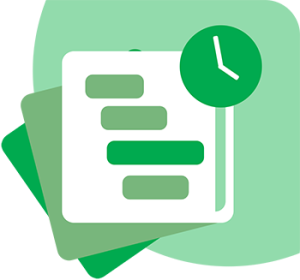Getting a mortgage: how does it work?

When you want to buy a house you will probably need a mortgage. After all, few people have the luxury of being able to finance a house all by themselves. And so you will have to knock on a bank’s door to take out a loan. But taking out a mortgage, how does this work? What mortgages are actually out there? What is the maximum amount you can borrow? And how much does it cost? We tell you all about it below.
First things first, what is a mortgage anyway?
When you take out a mortgage you take out a loan, and in exchange for that loan – as security for the person lending you money – you provide collateral. This collateral is your house. So that means that if you cannot pay your loan (the interest and nowadays the repayment), the person who lends you money can appropriate the collateral you have made available. You provide the bank (or the other person/institution lending you money) with a mortgage.
The different mortgage forms
Today, there are two mortgage types: an annuity mortgage and a linear mortgage. The difference between these types is in how you repay the loan.
- Annuity mortgage
With an annuity mortgage, you pay more interest than principal at the start. The repayment you pay goes up over the years. This is often concluded with the thought “we are going to earn more in the future and can then pay more than we do now. You can deduct part of the interest from your taxes, called the mortgage interest deduction. Note that this deduction is slowly being phased out by the government. So in the beginning, an annuity mortgage is more advantageous because you are currently allowed to partially deduct the interest. And initially, the biggest focus with this form is on interest. Over the years, your repayment amount per month goes up. This makes this mortgage more advantageous than a linear mortgage in the beginning.
- Linear mortgage
With a linear mortgage, the amount you pay is the same over the term (often 30 years), but you start paying proportionately less and less interest. The repayment amount remains the same. So proportionally, you are going to pay off more and more and pay less interest.
If you already have a mortgage, could it be smart to make additional repayments? Read it here.
How much mortgage can you get?
How much mortgage you can get depends on a number of aspects. This depends on your situation, such as your position in the housing market and whether you are also selling a house, for example. Also, these days the government is stricter about looking at debt (hello uncle DUO). With debt, you can borrow less. In addition, your income, your employment, your equity all matter. Let’s take one piece at a time.
- Your income. Your income determines what you can get in terms of a mortgage, and that makes sense. How much you earn determines how much you can spend per month on housing costs. Also, for a mortgage, the bank checks whether you are employed or working for yourself. A rule of thumb is that if you are employed you can borrow about 4.5x your gross annual salary. If you earn €50,000 a year, you can get €225,000 in mortgage. Approximately, because whether you bring your own money or have a partner who is also responsible for the mortgage changes what your maximum mortgage can be.If you work for yourself, the mortgage lender will often want to see your business records for the past 3 years. Maybe you are just starting out and don’t have 3 years of grades yet. Even then, there are often options. It is best to contact a mortgage advisor.
- Your equity. If you have your own money, you need to borrow less and the loan the bank gives you is less than the value of your house. A bank likes this, because less risk. This impacts mortgage rates.
- Your current living situation. Do you have a purchase home that you can/should sell with excess value or debt? This impacts the maximum mortgage. For example, if you have excess equity now, you can free up additional equity when you sell your home, and that may mean a lower mortgage.
- Your debts (such as student debt). Recently, mortgage lenders have become much stricter on student debt. This article explains exactly how much impact student debt has on how much mortgage you can get.
Generally, you can borrow up to 100% of the home value which often equals the purchase price. If you are under 35 and you buy a house under 4 tons, you do not have to pay transfer tax. That means the own money you have to put in is the cost of the notary and possibly a buying agent. Are you over 35 and buying a house over 4 tons? Then you pay 2% transfer tax, and you have to bring this amount in your own money.
Also of interest is to check if you qualify for an NHG mortgage. An NHG mortgage stands for: National Mortgage Guarantee. In doing so, you give the lender assurance that your mortgage debt will be repaid. If you are unexpectedly unable to pay your mortgage due to divorce, unemployment, drop in income, disability or the death of your partner, NHG will step in. There are some conditions attached to this, however, check the Homeowner’s website for that .
Costs, redemption and interest
There are considerable costs involved in taking out a mortgage. Thus, you will face finance charges to close the loan. Examples include consulting fees, administrative fees and notary fees. This is often 1 to 2% of the mortgage amount, and these costs are tax deductible. Do you still have an old mortgage? If so, you will have to pay departure fees for transferring them.
In addition, you repay a portion of your loan each month so that you will be mortgage-free within 30 years. You also pay interest on the remaining mortgage amount. The amount of interest depends on the price of your home and the interest rate.
Before taking out a mortgage, it is always wise to talk to a mortgage broker. That way, you can be sure that you are taking out an appropriate loan and you can ask any questions you may have.
In practice: taking out a mortgage, how does this work?
If you’ve found a house, made an offer and can buy it, the task is to complete the mortgage. If you are smart, you have a good understanding of what your options are even before you make an offer. How much you can borrow and on what terms. When all is said and done, the mortgage lender is going to request a lot of data from you. Your income, your assets, your debts, the details of any partner, your insurances (if you take out a mortgage you must also take out certain insurances) and your employment. This is because the mortgage lender wants as much assurance as possible that you are going to pay off your debt and be able to pay the interest each month.
If you have submitted all your information then the mortgage lender has to process it, look at it and judge it. This whole process can take as long as 4 to 6 weeks.
Don’t count yourself rich
The lender makes money from the interest you pay. If you pay interest every month for 30 years, the total amount you put down to own your house 100% is many times higher than the purchase amount. Therefore, it may pay to make extra repayments on your home or not borrow 100%. It’s smart to do some good math.





